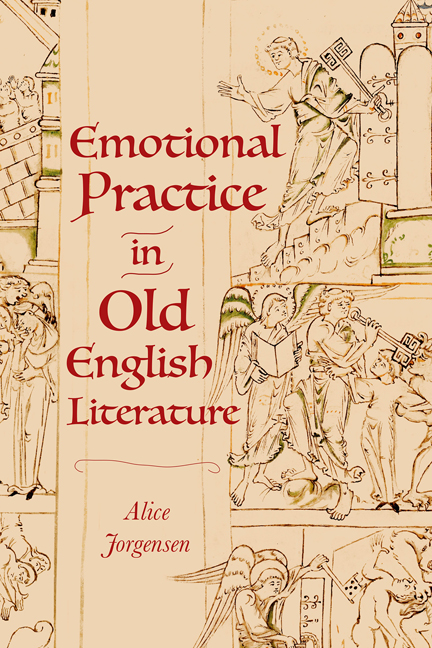Book contents
- Frontmatter
- Dedication
- Contents
- Acknowledgements
- Abbreviations
- Introduction: The Wanderer and Emotional Practice
- 1 Participating in a Heroic Emotional Style: Beowulf
- 2 Uses of the Heroic Style: The Battle of Brunanburh and The Battle of Maldon
- 3 Controlling and Converting Emotion: The Old English Boethius
- 4 Relating to the Divine in the Exeter Book: Christ I and Christ III
- 5 Performing Fear in Old English Homilies
- Conclusion
- Bibliography
- Index
- Miscellaneous Endmatter
3 - Controlling and Converting Emotion: The Old English Boethius
Published online by Cambridge University Press: 09 May 2024
- Frontmatter
- Dedication
- Contents
- Acknowledgements
- Abbreviations
- Introduction: The Wanderer and Emotional Practice
- 1 Participating in a Heroic Emotional Style: Beowulf
- 2 Uses of the Heroic Style: The Battle of Brunanburh and The Battle of Maldon
- 3 Controlling and Converting Emotion: The Old English Boethius
- 4 Relating to the Divine in the Exeter Book: Christ I and Christ III
- 5 Performing Fear in Old English Homilies
- Conclusion
- Bibliography
- Index
- Miscellaneous Endmatter
Summary
THE PRESENT chapter turns to the most extensive theorization of emotion and mind in Old English: the Old English translation of the De Consolatione Philosophiae (DCP) by Anicius Manlius Severinus Boethius (c. 480–c. 525/6). The translation survives in two versions, the B-text, which is entirely in prose, and the C-text, which, like the Latin, alternates prose and poetry. The Old English Boethius starts from problematic emotion, extreme sorrow, and advocates control of unruly passions. Long attributed to King Alfred, though his authorship is now doubted, it has been read in terms of political thought, shows an interest in the ethics of administering justice, offers a famous passage on kingship, and thus speaks, if in a very different way, to the concerns of the secular aristocrats who are the obvious audience of Beowulf. On the other hand, it is concerned with the nature of the good, the problem of evil and God's action in the world. The tradition of glossing that was already accumulating in the ninth century provided the Old English translator with a Christian lens on the Stoic and Neoplatonic materials of the DCP. The Boethius forms a bridge in the present study between the heroic poetry of the first two chapters and the explicitly religious texts examined in the last two. At the same time, it is different from either group, not least because it is explicitly theoretical; accordingly, the present chapter is more focused on concepts than others in this book and less on how the focal text directly scaffolds practice. Nonetheless, the Boethius provides not only a set of ideas about emotion but also a model for governing the mind and thus a blueprint for emotional practice.
Both the relationship of the Boethius to other texts and issues of its audience and use are rendered problematic by Malcom Godden's argument that it is not, after all, the work of Alfred, nor even necessarily a product of his reign. Godden's case has various aspects, including the observation that the prose preface declaring Alfred's authorship does not appear to be original and questions about Alfred's opportunity or capacity to produce such a work, but an important part of it stresses the uniqueness of this text and the closely related Soliloquies.
- Type
- Chapter
- Information
- Emotional Practice in Old English Literature , pp. 104 - 139Publisher: Boydell & BrewerPrint publication year: 2024



